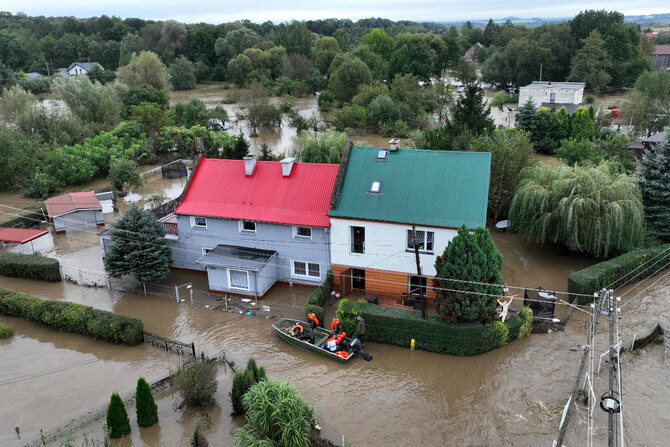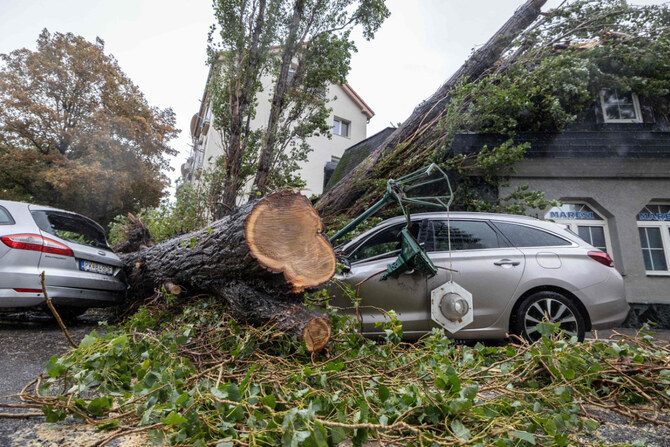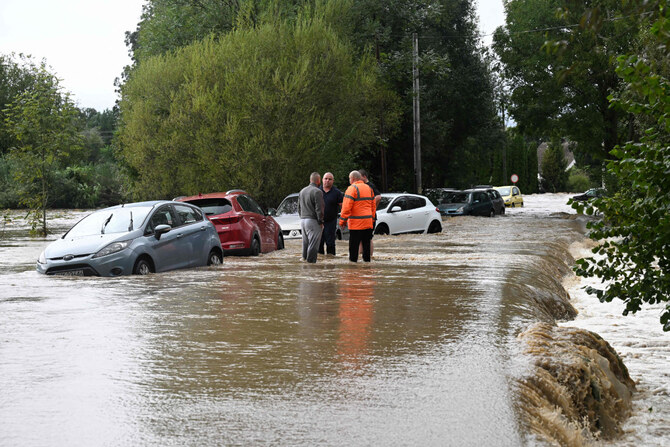PRAGUE: The death toll was rising in central European countries on Sunday after days of heavy rains caused widespread flooding and forced evacuations.
Several Central European nations have already been hit by severe flooding, including Austria, the Czech Republic, Poland and Romania. Slovakia and Hungary might come next as a result of a low pressure system from northern Italy dumping record rainfall in the region since Thursday.
The floods have claimed six lives in Romania and one each in Austria and Poland. In the Czech Republic, four people who were swept away by waters were missing, police said.
It’s not over yet
Most parts of the Czech Republic have been affected as authorities declared the highest flood warnings at around 100 places across the country. But the situation was worst in two northeastern regions that recorded the biggest rainfall in recent days, including the Jeseniky mountains near the Polish border.
In the city of Opava, up to 10,000 people out of a population of around 56,000 have been asked to move to higher ground. Rescuers used boats to transport people to safety in a neighborhood flooded by the raging Opava River.
“There’s no reason to wait,” Mayor Tomáš Navrátil told Czech public radio. He said that the situation was worse than during the last devastating floods in 1997, known as the “flood of the century.”
“We have to focus on saving lives,” Prime Minister Petr Fiala told Czech public television on Sunday. His government was set to meet Monday to assess the damages.
The worst “is not behind us yet,” the prime minister warned.
President Petr Pavel sounded more optimistic, saying “it’s obvious we’ve learned a lesson from the previous crisis.”
At least 4 missing and villages cut off
Thousands of others also were evacuated in the towns of Krnov, which was almost completely flooded, and Cesky Tesin. The Oder River that flows to Poland was reaching extreme levels in the city of Ostrava and in Bohumin, prompting evacuations.
Ostrava, the regional capital, is the third-largest Czech city. Mayor Jan Dohnal said the city will face major traffic disruptions in the days to come. Almost no trains were operating in the region.
Towns and villages in the Jeseniky mountains, including the local center of Jesenik, were inundated and isolated by raging waters that turned roads into rivers. The military sent a helicopter to help with evacuations.
Jesenik Mayor Zdenka Blistanova told Czech public television that several houses in her and other nearby towns have been destroyed by the floods. A number of bridges and roads have been badly damaged.
About 260,000 households were without power Sunday morning in the entire country, while traffic was halted on many roads, including the major D1 highway.
A firefighter dies as Lower Austria declared a disaster zone
A firefighter died after “slipping on stairs” while pumping out a flooded basement in the town of Tulln, the head of the fire department of Lower Austria, Dietmar Fahrafellner, told reporters on Sunday.
Authorities declared the entire state of Lower Austria in the northeastern part of the country a disaster zone, while 10,000 relief forces have so far evacuated 1,100 houses there. Emergency personnel have started setting up accommodation for residents who had to flee their homes due to the flooding.
The municipality of Lilienfeld with about 25,000 residents is cut off from the outside world. Residents were told to boil tap water as a precaution.
The situation is particularly dangerous along the Kamp River, which flows into the Danube. The Ottenstein reservoir on the river functions as a buffer, but exceeding its limits could cause more flooding, experts say.
Austrian Chancellor Karl Nehammer said the situation “continues to worsen.” He said 2,400 soldiers were ready to support the relief effort in Austria. Of those, 1,000 soldiers will deploy to the disaster zone in Lower Austria, where dams were beginning to burst.
“We are experiencing difficult and dramatic hours in Lower Austria. For many people in Lower Austria these will probably be the most difficult hours of their lives,” said Johanna Mikl-Leitner, the governor of Lower Austria.
In Vienna, the Wien River overflowed its banks, flooding homes and forcing first evacuations of nearby houses.
Romania reports 2 more flooding victims
Romanian authorities said Sunday that another two people had died in the hard-hit eastern county of Galati after four were reported dead there a day earlier, following unprecedented rain.
Dramatic flooding in Poland
In Poland, one person was presumed dead in floods in the southwest, Prime Minister Donald Tusk said Sunday.
Tusk said the situation was “dramatic” around the town of Klodzko, with about 25,000 residents, located in a valley in the Sudetes mountains near the border with the Czech Republic. Helicopters were used to pick up people from roofs in a few cases.
In Glucholazy, rising waters overflowed a river embankment and flooded streets and houses. Mayor Paweł Szymkowicz said, “we are drowning,” and appealed to residents to evacuate to high ground.
A bridge in the town collapsed under the flood pressure and a police station building was knocked down in Stronie Śląskie, after floodwaters burst through a dam. Submerged cars could be seen in many places in the Kłodzko Valley region bordering the Czech Republic, while a new flood wave was expected there.
In the city of Jelenia Gora, which has 75,000 residents, downtown streets were flooded after one of the embankments burst on the Bobr River. City authorities have warned residents they may need to evacuate as more flooding was moving toward the city.
Energy supplies and communications were cut off in some flooded areas, and regions may resort to using the satellite-based Starlink service, Tusk said.
The weather change arrived following a hot start to September in the region. Scientists have documented Earth’s hottest summer, breaking a record set just a year ago.
A hotter atmosphere, driven by human-caused climate change, can lead to more intense rainfall.
Death toll rises as torrential rain and flooding force evacuations in central Europe
https://arab.news/n4mpm
Death toll rises as torrential rain and flooding force evacuations in central Europe

- Several countries have already been hit by severe flooding, including Austria, the Czech Republic, Poland and Romania
- The floods have claimed six lives in Romania and one each in Austria and Poland, while four were declared missing in Czech Republic
Musk says he will finish most of $1 trillion federal cost cuts within weeks

- DOGE estimates it has saved US taxpayers $115 billion as of March 24
Tech billionaire Elon Musk, whom US President Donald Trump has tapped to shrink the government, said on Thursday he would finish most of the work to cut $1 trillion in federal spending when his tenure ends in as soon as 64 days.
Musk told Fox News’ “Special Report with Bret Baier” that he was confident his Department of Government Efficiency could find $1 trillion in savings, slimming current total federal spending levels of about $7 trillion down to $6 trillion.
Musk, the world’s richest person, was designated by the White House as a “special government employee,” which caps his work at 130 days. That means his period leading the DOGE operation could finish as soon as the end of May.
“I think we will accomplish most of the work required to reduce the deficit by a trillion dollars within that time frame,” Musk said when asked by Baier about his tenure and how quickly he expected to achieve his cost-cutting target.
“The government is not efficient, and there is a lot of waste and fraud, so we feel confident that a 15 percent reduction can be done without affecting any of the critical government services,” Musk said.
DOGE estimates it has saved US taxpayers $115 billion as of March 24 through actions including workforce reductions, asset sales and contract cancelations.
However, the savings total published on the DOGE website is unverifiable and its calculations have been riddled with errors and corrections. Budget experts say Musk cannot reach his target without touching entitlement programs like Social Security, which Trump has vowed not to cut.
The interview marked the first time that Musk and his top lieutenants at DOGE met with media to explain their work. Musk was joined by seven other DOGE executives, including Steve Davis, the president of Musk’s tunneling enterprise the Boring Company, and Joe Gebbia, co-founder of Airbnb.
“Unless this exercise is successful, the ship of America will sink. That’s why we’re doing it,” said Musk, who is also CEO of electric car maker Tesla.
Musk’s role in slashing the federal workforce and government agency budgets has drawn political backlash in recent weeks, with Tesla cars and dealerships hit by a spate of vandalism and demonstrations across the country.
US pushing more expansive minerals deal with Ukraine

- Under proposal Kyiv would contribute to joint fund all income from use of natural resources
- Deal to strengthen US-Ukraine ties, official says, without confirm the terms of the latest proposal
The Trump administration has proposed a new, more expansive minerals deal with Ukraine, according to three people familiar with the ongoing negotiations and a summary of a draft proposal obtained by Reuters.
The US has revised its original proposal, said the sources, and it gives Ukraine no future security guarantees but requires it to contribute to a joint investment fund all income from the use of natural resources managed by state and private enterprises across Ukrainian territory.
The terms put forward by Washington go well beyond the deal discussed in the days leading up to the contentious Oval Office meeting last month between US President Donald Trump and Ukrainian President Volodymyr Zelensky.
Treasury Secretary Scott Bessent has been leading negotiations for the United States, said one of the sources.
Bessent did not immediately respond to a request for comment.
The proposal makes no mention of the US taking ownership of Ukraine’s nuclear power plants, according to the summary — something Trump had talked about.
Trump has said a minerals deal will help secure a peace agreement by giving the United States a financial stake in Ukraine’s future. He also sees it as America’s way of earning back some of the tens of billions of dollars it has given to Ukraine in financial and military aid since Russia invaded three years ago.
National Security Council spokesperson James Hewitt declined to confirm the terms of the latest proposal, but said the deal would strengthen the relationship between the US and Ukraine.
“The mineral deal offers Ukraine the opportunity to form an enduring economic relationship with the United States that is the basis for long term security and peace,” said Hewitt.
Ukraine’s ministry of foreign affairs did not immediately respond to a request for comment.
An earlier version of the deal proposed a joint investment fund where Ukraine would contribute 50 percent of proceeds from the future profits of the extraction of the state-owned natural resources. It also set out terms that the US and Ukraine would jointly develop Ukraine’s mineral resources.
Zelensky told reporters on Tuesday that the US had proposed a “major” new deal and that Ukrainian officials were still reviewing its terms.
Zelensky said on Thursday the US is “constantly” changing the terms of the proposed minerals deal, but added that he did not want Washington to think Kyiv was against the deal.
In an interview with Fox News earlier this week, Bessent said the US had “passed along a completed document for the economic partnership” and that Washington hopes to “go to full discussions and perhaps even get signatures next week.”
The new proposal stipulates that the US is given first rights to purchase resources extracted under the agreement and that it recoup all the money it has given Ukraine since 2022, in addition to a 4 percent annual interest rate, before Ukraine begins to gain access to the fund’s profits, according to the summary. The updated proposal was first reported by the Financial Times.
If agreed, the joint investment fund would have a board of five people, three appointed by the US and two by Ukraine, and the funds generated would be converted into foreign currency and transferred abroad, according to the summary. The fund would be managed by the US International Development Finance Corporation (DFC).
A separate source with knowledge of the negotiations said there had been discussions about having the DFC administer the fund.
US Attorney General Bondi tells Fox News many judges need to be removed

WASHINGTON: US Attorney General Pam Bondi said on Thursday many of the judges who have recently ruled against the administration of President Donald Trump need to be removed.
“These judges obviously cannot be impartial. They cannot be objective,” Bondi said during an interview on Fox News’ “The Ingraham Angle” show.
“They are district judges trying to control our entire country, our entire country, and they are trying to obstruct Donald Trump’s agenda.”
Maduro calls Rubio ‘imbecile’ over Venezuela threats

CARACAS: Venezuelan President Nicolas Maduro on Thursday slammed US Secretary of State Marco Rubio as an “imbecile” following the American’s warning to Caracas against attacking its oil-rich neighbor Guyana.
“There goes the imbecile Marco Rubio threatening Venezuela from Guyana. No one threatens Venezuela because this is the homeland of the liberators,” Maduro said.
German air force wards off Russian reconnaissance plane

- Tensions over the Baltic Sea have heightened since Russia’s full-scale invasion of Ukraine in 2022
BERLIN: A Russian reconnaissance aircraft approached northeastern Germany on Thursday before it was escorted away by fighter jets, the German air force said.
The air force said on its Whatsapp communication channel that its Quick Reaction Alert (QRA) was activated at the Laage air base near Rostock, on the Baltic coast in the northeast.
“The reason was an unknown aeroplane over the Baltic Sea, which was flying without a flight plan or activated transponder,” the air force said in the message, which confirmed an earlier press report in Bild.
German Eurofighter jets were scrambled to identify the Ilyushin Il-20 reconnaissance plane, which was subsequently “escorted” back toward the Russian exclave of Kaliningrad, from where it was first tracked.
Bild said the Russian aircraft was found early Thursday east of the German Baltic island Rugen from where it was heading toward “German air space.”
The fact that the aircraft’s transponder was deactivated presented “a considerable danger to civilian air traffic,” Bild said.
Military sources quoted by Bild said that Russian reconnaissance planes were occasionally identified off the German coast.
Many NATO nations have a QRA system to help protect their air space.
Tensions over the Baltic Sea have heightened since Russia’s full-scale invasion of Ukraine in 2022.





















